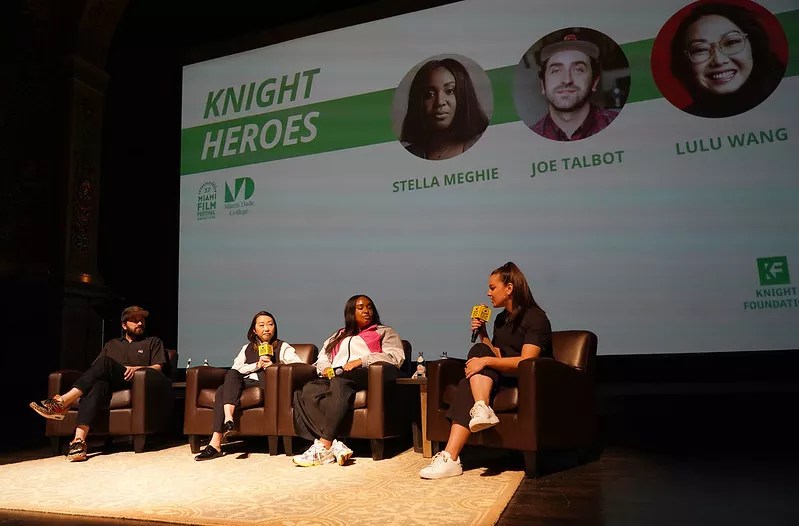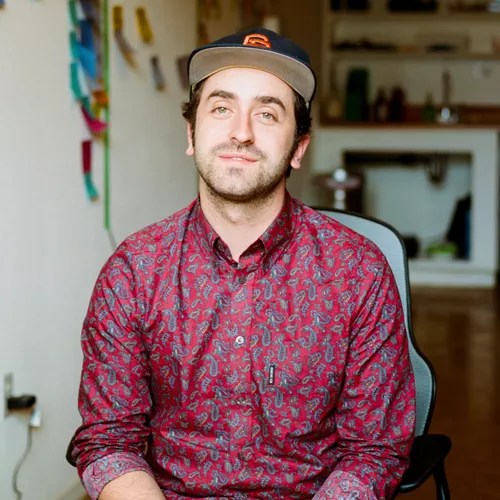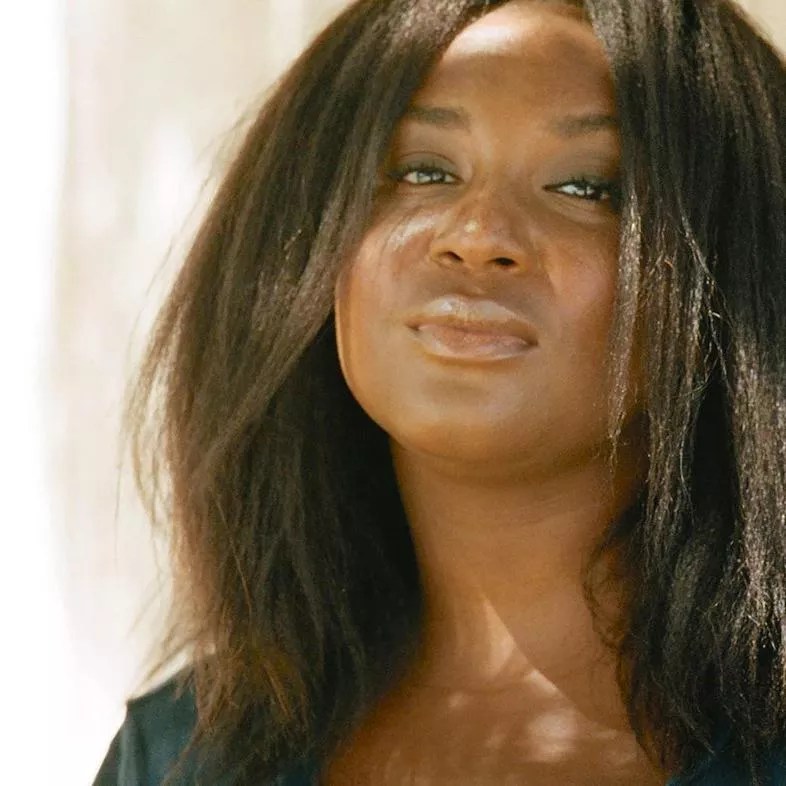
Photo courtesy of Miami Film Festival

Audio By Carbonatix
On Thursday, March 12, the Miami Film Festival ended prematurely in an effort to heed local and state officials’ advice for curbing the spread of coronavirus. The festival had originally been scheduled to conclude on Sunday, March 15. A number of screenings and events were canceled as a result, but one of MFF’s recently introduced programs that’s gone on to become a signature event – the Knight Heroes Masterclass – managed to miss the chopping block.
The chat brought high-profile film talents Stella Meghie, Joe Talbot, and Lulu Wang to the Olympia Theater to share words of wisdom with Miami’s film community. Honorees took to the stage to discuss their struggles and successes on their respective journeys to becoming award-winning directors.
New Times had the pleasure of sitting down with Talbot and Meghie to learn more about their filmmaking process and inspirations just before such exchanges became all-but-impossible in our brave, new quarantined world.

Director Joe Talbot
Courtesy of Joe Talbot
Joe Talbot Talks Music, Failure, and San Francisco’s Gentrifying Techies
Joe Talbot is from San Francisco. His feature film debut, The Last Black Man in San Francisco – adapted from the life story of his longtime collaborator Jimmie Fails – premiered at Sundance Film Festival, where it won the US Dramatic Best Director Award, as well as a Special Jury Prize for Creative Collaboration. The film was nominated in the best first feature categories at the 2020 Spirit Awards and the 2020 Directors Guild of America Awards. The Last Black Man in San Francisco was released by A24 Films and is currently available on a number of streaming platforms including Amazon and Apple TV.
The film is an ode to San Francisco, which is rapidly shifting due to development and gentrification. In essence, it’s a love letter meant to preserve the city’s culture for future generations. The theme of Talbot’s Knight Heroes talk was the internal divide many creatives feel to leave the city they love for someplace new where there may be opportunity and excitement versus the benefits of staying in an ever-changing city. (In light of recent events, this dichotomy has become a whole lot simpler for many people.)
“You worry if you leave, you may come back to a city that is altogether unrecognizable,” Talbot says. He admits that the initial script for the film was angrier in tone because his connection to the city was like a fraught relationship, one in which he was appalled that the city would abandon him for toe-shoe-wearing techies.
New Times: What is something that has come with the success of The Last Black Man in San Francisco that you didn’t expect?
Joe Talbot: Calm. There’s some sort of calm that happens when you’re done with a film. Making this movie defined us for five years. We went public with it very early on, so everyone in the city knew us by this film long before it was finished. We felt encouraged by all the native San Franciscans who would shout us out on the street, but we also felt pressure to do right by them and make something that they’d be proud of. There’s a little cloud of anxiety that follows you while you’re making a movie. Not to sound morbid, but with the movie that we made, I feel like if I die today, at least I made something that I’m proud of, you know? It exists.
You were a co-writer and director on the film. Which do you prefer, writing or directing?
I am tortured when I am writing, and I do not like it. I just want the script to be perfect and then we can go shoot it. I am always writing as a means to direct. I don’t love that writing process. I’ve been told that my strength as a director is that I learn quickly. I had no experience going into this film, so I had to learn a lot and experiment. It was really important for me to absorb as much as I could and to trust the people around me.
What would you say is your superpower as an artist?
Empathy. I’ve always felt a lot, sometimes too much, even when I was a kid. Most of my friends are similar. The film required a lot of empathy for all involved because I was basically working with my best friends, and we all screw up sometimes.
What is a superpower that you wish you had but don’t have?
Awww, so many things. I grew up in a family of writers so I’ve seen great writing. I wish I could get to that place of writing quicker. For me it sometimes takes 8 drafts when it should just take 2 drafts. I hope that becoming a better writer is something that comes with time.
Is there something people don’t know about you that would surprise them?
I used to make music when I was in high school. I was the white kid who made beats for a lot of local rappers in San Francisco. I would record their music from my childhood bedroom. I’d have like 20 people in my bedroom with a microphone. Some of those people are in the movie. That’s actually how I met Mike Marshall who famously sings on “I Got Five On It.” In the movie, he’s the one singing “If You’re Going to San Francisco.” I met him when I was like 14. Someone brought him over to my house to record the chorus for a song and I was so excited. I had to make sure I didn’t have stuffed animals on my bed. My mom made cookies and I was so embarrassed.
What is a movie that you saw and immediately wished you’d made?
Lovers on the Bridge by Leos Carax and Lola Montès by Max Ophüls. I was like if I make anything like this, then I can really die! [Laughing.]
Is there a book or song that changed your life?
Less a song, but an artist that changed my life was Jefferson Airplane. My high school girlfriend would play them. I grew up on Jefferson Airplane, but my parents listened to it. My girlfriend sort of gave me permission to like them in a different way. She made it cool because she was cool. That opened this rabbit hole to all this 60s San Francisco music that would end up in our movie all these years later.
Tell me about a time that you failed.
We got into the Sundance Screenwriters Lab and couldn’t believe that we got in there, and it was great because it was so unexpected. After that there’s an invite-only Directors Lab, and I was feeling really strong about our project. We had really come to know the folks at Sundance and they seemed to like us. We didn’t get invited back for the Directors Lab. There were really great filmmakers who got in, and I admired many of them. And Sundance was really supportive of us. Still, there is a part of you that hurts a little. It’s hard to not question yourself. I felt like after four years of working on The Last Black Man, that was a bit of a blow. I was sad because I just wanted to learn how to direct, you know. I still needed to learn a lot. Luckily, we got funding to do a short and that helped us sort of catapult to the next level. Our short got into Sundance, and that’s where we met A24 and Plan B. You gotta go through the motions when you fail, be upset, and try to find a way to have it push you forward.
What advice would you give young filmmakers?
Make movies with your friends. You definitely have moments when you’re at each other’s throats, but it can work.
What advice would you give to 15-year-old you?
It sounds corny, but I’d say, “Don’t worry.” For a long time through to your 20s, you’re nervous about what you’re going to do with your life. You’re stressed about finding your place in the world: “Will I ever find what motivates me?” I’d tell my younger self to just stop worrying.
What is your favorite stage of filmmaking?
Scoring. I love it. It takes me back to my childhood where you’re just experimenting. Watching music and how the power of music changes the film so much. It’s also the final piece. Everything else is pretty much done, so you can just enjoy the process.
Were there any challenges for you as a white director of a film that deals with black issues?
It’s something that Jimmie and I talked about a lot. There are a lot of well-intentioned films made by white directors and they can miss the point. Or, you see that hand in a way that feels like it takes you away from something that feels more honest. For so long, it’s been mostly white guys getting a chance to make movies, so you do think about that. Not only is this a black film, but it also has such a bold title. Jimmie and I decided that this particular film starts and ends with a friendship. There are a lot of San Francisco movies that I wouldn’t be the right person to tell the story, but this is one that I knew very well from my friendship with Jimmie. I try really hard to always be scrutinizing myself and questioning how we, as a team, get to the greatest truth across all boundaries.

Stella Meghie
Photo by Christian Werner
For Stella Meghie, Scrappiness is a Virtue and Star Trek is a Wonderful Obsession
Stella Meghie is originally from Toronto, Canada. Her feature film debut, Jean of the Joneses, premiered at SXSW and received screenwriting nominations at the 2017 Spirit Awards and the 2017 Canadian Screen Awards. Her debut gained the attention Hollywood studios, and she next directed Amandla Stenberg and Nick Robinson in the Warner Bros film Everything, Everything. Her third film, the American comedy The Weekend (now streaming on Amazon), premiered at Toronto International Film Festival and was released by Lionsgate. Her most recent release is currently in movie theaters – the critically-acclaimed romance The Photograph, starring LaKeith Stanfield and Issa Rae.
Meghie started her professional career in fashion PR even though she always knew she wanted to do something more creative like writing. She worked for a while but eventually decided to take the leap and apply to film schools. She got into a graduate screenwriting program at the University of Westminster in the United Kingdom and hasn’t slowed down since.
New Times: What is something that has come with success that you didn’t expect?
Stella Meghie: Stress. There’s just a pressure that you start to feel… like the bigger the next project, the more you have to deliver.
You generally write and direct your films. Which do you prefer, writing or directing? What are the challenges of each?
Now, I lean more towards directing. I started out exclusively as a writer because that’s what I thought I would be solely. I’ve spent a lot of time writing. I wrote Jean of the Joneses, The Weekend, and The Photograph all before I’d directed anything. I feel closer to directing because that’s what I’ve done the past few years more exclusively. The challenge as a writer is to actually push yourself to sit down and write. As a director, the challenge is physically getting your work made. I have a friend who says that writing is like working back-of-house and directing is very much front-of-house. Directing uses my diplomatic, extrovert, political and hostess skills.
In the writing world, I always feel like the possibilities are limitless. In the directing world, it always feels like you have to make a series of compromises. Do you feel that way?
I don’t think so because I always write very practically. I write thinking about the film and I put some boundaries on myself with that in mind. I wrote The Weekend knowing that I wanted something that I could easily shoot. I often operate inside those parameters.
Tell me about a time that you failed and what you learned.
I was never really happy about how Everything, Everything came out. I learned a lot about directing other people’s writing, adaptations, and working with a studio.
What didn’t you like about it specifically?
I just never really got the tone that I wanted to get. I loved the book so much, but I don’t know that I got some of the humor and quirkiness into the film.
What advice would give to young filmmakers?
Don’t be afraid to be difficult. Just be scrappy. I’ll talk about it later in my talk, but I always say that there was a moment in my life right before I made my first film where I realized that I was more like Mike Tyson than Muhammad Ali. I was really fighting to get my work made.
What advice would you give to 15-year-old you?
Stop crying. [Laughter]. Yeah, I could give that advice to myself now too.
What is your superpower?
Talking. In my career it’s helped me to learn to convince people and persuade them.
I wish my superpower was____.
Calmness. [Laughter].
What is something people don’t know about you that would surprise them?
I’m a Trekkie.
Me too!
I just started watching Picard, it’s so good.
What’s your favorite series?
Next Generation.
Me too! Do you have a crush on Picard?
No. I don’t think so.
Do you have a crush on Riker?
I don’t believe I did.
Am I making assumptions that I shouldn’t?
My favorite character was Data. [Laughs]
Really?
See, it is in my aspirations to become like him.
What’s your sign?
Libra.
Mmm. Okay. Moving on.
[Laughs.] I didn’t have a crush on Data. He’s just my favorite character.
Movie you wish you made and why?
The Great Beauty. It’s one of my favorite films.
What is a book or song that changed your life?
Book-I would say White Teeth by Zadie Smith. That was the first time I realized that you could be black and intelligent, funny, quirky, and insightful.
What is your favorite stage of filmmaking?
I think I love them all equally. I just think when you’re writing you have your own schedule and my head is really in it. I love that. On set, if you have a good set and crew, it’s fun to go to work. Exhausting but fun. Editing is the same. It’s like hanging out and working on things. They all have different levels of stress.
Do you have a dream project?
I don’t want to say because I’m chasing it right now.
What about a dream collaboration?
I want to work with cinematographer Bradford Young so bad.
What question do you hate being asked in interviews? I should have asked this first, but I guess I didn’t care to know ahead of time.
[Laughs] I hate when people ask me about… you know I write a lot of middle-class characters, and I hate it when people ask me about that versus writing trauma stories. I’m just like I don’t write those trauma stories.
What do you want your artistic legacy to be?
Many, many films about black women and their emotional, philosophical, and intellectual journeys.
What does filmmaking need more of?
More points of view and more genres.
How has your life changed since your last film?
I have more money. [Laughs] That matters a lot because you can choose what you want to do. You don’t have to do anything that doesn’t serve your purpose in filmmaking. Also, more people know me.
Do you prefer directing TV or film?
I love film because I love the short form of it. It is just two hours and you can follow that journey to the end. I am developing TV projects, but they are a bigger commitment and process.
What are your inspirations?
Really, my friends and family. With The Weekend, my mom runs a bed and breakfast, and one weekend a hot, single guy checked into her bed and breakfast, which is odd because couples go to bed and breakfasts or girls go on a girls’ trip-not hot, single guys. Anyway, that’s where that film started. Jean of the Joneses is my family. The Photograph is the farthest away from my personal experiences. It was gratifying to create this world that I didn’t come from my own life experience.
There’s this thread of self-sacrifice in many of your characters. Like, they put themselves in these compromising positions for other people. They’re all smart, quirky, accomplished in their own ways. Why do they do this?
I don’t know. All my characters make bad decisions about their well being. I guess all my characters are stuck in the past in some way. I’m always exploring the past as a way to move forward.
Are you stuck in the past in some ways?
No. I don’t think so. I’m always looking forward. I’m only as good as what’s happening next. I rarely dwell on the past so maybe my filmmaking is the time I take to be introspective.